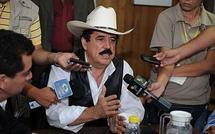Zelaya skeptical ahead of Honduran talks
Maria Isabel Sanchez
TEGUCIGALPA, Maria Isabel Sanchez - President Manuel Zelaya said Monday that he did not believe the military-supported government of Roberto Micheletti would let him return to power, a key condition for ending the months-long political crisis.
Representatives of Zelaya and the de facto regime are to meet Tuesday to negotiate the final details of an Organization of American States-brokered deal that has snagged on the thorniest point -- Zelaya's reinstatement.

"I believe that the putschist regime will continue refusing to implement the resolution of the OAS and the international community," he said, referring to a measure calling for Zelaya's return to power.
Zelaya was kicked out of the country at gunpoint in his pajamas in a June 28 military coup, but snuck back into Honduras nearly three months later to face off against the regime that ousted him from power.
"I am always open to dialogue, but I have no trust in the putschists. It will be a slap in the face against the international community if they refuse to restore what they usurped," he said.
And if talks fail?
"We will continue fighting in the streets and the crisis will deepen," Zelaya said.
Zelaya said he believes Micheletti's negotiators are playing for time so they can hold elections on November 29, a vote many countries have already said they would not recognize if held by the interim regime.
Representatives of Zelaya and Micheletti last week agreed on most of the provisions of the San Jose Accord, an agreement hammered out by Costa Rican President Oscar Arias. But they have yet to deal with the most important point, Zelaya's future.
Zelaya negotiator Juan Barahona said Zelaya must return to power.
"As long as there is no agreement on restoring President Zelaya, all the other points on which we have made ground are meaningless," he said.
Regime negotiator Vilma Morales, who blamed "the international community" for causing the crisis, said no single point could take priority.
Both sides have said they are not seeking amnesty for crimes allegedly committed during the crisis, a point raised by Arias.
The Micheletti regime has accused Zelaya of 18 crimes, including treason, corruption and abuse of authority.
The regime on Saturday published a decree in the official gazette authorizing officials to "revoke and cancel" licenses of radio and television stations considered to be a threat to "national security" and accused of spreading "hatred."
"Engaging in dialogue while also pounding with a club are not ways to find a way out of the conflict," anti-coup activist Rafael Alegria told AFP.
A high-level OAS delegation left Honduras last week without resolving the impasse, though John Biehl, a veteran Chilean diplomat who stayed behind at the head of an OAS team still in Honduras, remained optimistic.
At the United Nations, Zelaya's foreign minister Patricia Rodas said that if the deposed president is not restored by the October 15 deadline he set then the international community must impose further sanctions.
Rodas also demanded that nations show "firmness" in refusing to recognize the interim Honduran regime.
Rodas said that the United States, the source of 70 percent of foreign investment in Honduras, is best positioned to pressure the regime.
A rancher known for his trademark white cowboy hat, Zelaya veered to the left after his election and alarmed conservatives by aligning himself with leftist Venezuelan President Hugo Chavez. They feared Zelaya was seeking to change the constitution to allow himself to seek reelection.
-----------------------------------------------------------------------------------------------------------------------------------